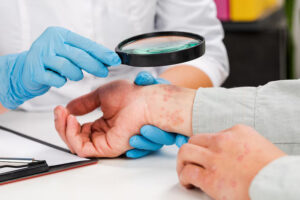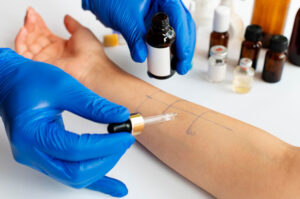Unraveling Skin Allergies: The Role of Testing and Medicine
Skin allergies are common conditions characterized by uncomfortable symptoms like itching, redness, swelling, and rashes. Identifying the specific allergens triggering these reactions is crucial for effective management. Skin allergy tests play a vital role in pinpointing these culprits, paving the way for targeted treatment with various allergy medicines.

Decoding the Triggers: Types of Skin Allergy Tests
Several types of skin allergy tests are used to identify the substances causing allergic reactions. The choice of test depends on the suspected allergen and the type of allergic reaction.
- Skin Prick Test (SPT): This is a common and relatively quick test used to identify immediate allergic reactions to airborne allergens (like pollen, dust mites, pet dander), foods, and some medications. Small drops of allergen extracts are placed on the skin, usually on the forearm or back, and the skin is gently pricked with a sterile lancet. A raised, itchy bump (wheal) surrounded by redness (flare) within 15-20 minutes indicates a positive reaction.
- Intradermal Test: This test is more sensitive than the skin prick test and is often used when the skin prick test is negative but there is still a strong suspicion of an allergy, particularly to certain medications or insect venoms. A small amount of allergen extract is injected just beneath the skin’s surface. A positive reaction is indicated by a raised bump at the injection site.
- Patch Test: This test is used to identify delayed allergic reactions, such as allergic contact dermatitis, which typically develop 24-72 hours after exposure to an allergen. Patches containing various potential allergens are applied to the skin, usually on the back, and left in place for 48 hours. The patches are then removed, and the skin is examined for any signs of a reaction (redness, swelling, blistering). A second reading is often done after another 24-48 hours.
Finding Relief: Types of Allergy Medicines
Once the trigger allergens are identified, various allergy medicines are available to manage and alleviate symptoms. These medications work through different mechanisms to counteract the allergic response.
- Antihistamines: These are commonly used to relieve mild to moderate allergy symptoms like itching, sneezing, runny nose, and hives. They work by blocking histamine, a chemical released by the body during an allergic reaction. Antihistamines are available over-the-counter and by prescription in various forms, including pills, liquids, and nasal sprays. Newer generation antihistamines are less likely to cause drowsiness.
- Corticosteroids: These are potent anti-inflammatory medications that can effectively reduce swelling, redness, and itching associated with allergic reactions. They are available in topical forms (creams and ointments) for skin allergies, nasal sprays for nasal allergies, inhaled forms for asthma, and oral or injectable forms for severe or widespread reactions. Due to potential long-term side effects, oral and injectable corticosteroids are typically used for short durations.
- Decongestants: These medications help to relieve nasal congestion associated with allergies by narrowing blood vessels in the nasal passages. They are available as oral medications and nasal sprays. Nasal decongestant sprays should be used for a limited time to avoid rebound congestion.
- Mast Cell Stabilizers: These medications help prevent the release of histamine and other inflammatory chemicals from mast cells, which are involved in allergic reactions. They are available as nasal sprays and eye drops and are often used for long-term management of allergic rhinitis and allergic conjunctivitis.
- Epinephrine Auto-injector: This is a life-saving medication used to treat severe allergic reactions (anaphylaxis). It delivers a single dose of epinephrine, which helps to reverse the dangerous symptoms of anaphylaxis, such as difficulty breathing, wheezing, and drop in blood pressure. Individuals at risk of anaphylaxis should always carry an epinephrine auto-injector and know how to use it.
- Immunotherapy (Allergy Shots or Sublingual Tablets): This is a long-term treatment that aims to desensitize the body to specific allergens. It involves gradually exposing the individual to increasing doses of the allergen over time. Immunotherapy can be administered through injections (allergy shots) or as sublingual tablets that dissolve under the tongue. It can be effective in reducing the severity of allergic reactions and potentially leading to long-term remission.
Conclusion
Skin allergy tests are invaluable tools for identifying the specific allergens triggering uncomfortable reactions. Armed with this knowledge, individuals can work with their healthcare providers to develop effective management strategies using a range of allergy medicines. From over-the-counter antihistamines to prescription corticosteroids and long-term immunotherapy, various options are available to alleviate symptoms and improve the quality of life for those living with skin allergies.
Frequently Asked Questions (FAQs)
1. What should I expect during a skin prick test?
During a skin prick test, small drops of allergen extracts will be placed on your skin, and the area will be gently pricked. You may feel a slight scratching sensation, but it is generally not painful.
2. How long do the results of a skin prick test take?
Results of a skin prick test are usually available within 15-20 minutes. The healthcare provider will observe your skin for any signs of a reaction.
3. Can I take my allergy medications before a skin allergy test?
It is usually recommended to avoid taking antihistamines for several days before a skin allergy test, as they can interfere with the results. Your doctor will provide specific instructions.
4. Are there any risks associated with skin allergy testing?
Skin allergy testing is generally safe. The most common side effects are mild itching and redness at the test sites, which usually resolve quickly. Severe reactions are rare but can be treated if they occur.
5. Which type of allergy medicine is best for me?
The best type of allergy medicine for you will depend on the type and severity of your allergy symptoms, your overall health, and other medications you may be taking. It is best to discuss your options with your doctor.
If you are experiencing bothersome skin allergies and want to identify your triggers and explore effective treatment options, our experienced specialists offer comprehensive skin allergy testing and personalized management plans. Visit our website at https://specialtycareclinics.com/services/allergy/ to learn more about our allergy services. Schedule an appointment today to take the first step towards clearer, healthier skin. You can also call us at (972) 865 4454 to book your consultation.

